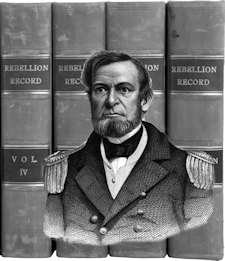8 Brevoort Place, January 7.
My Dear Girls: I have only time before mailing hour for a short letter, but must tell you how pleasantly Hatty’s and Carry’s little party went off last night. . . . Maillard sent up at eleven a very handsome little supper. . . . Bessie and Mr. Merchant came in the afternoon to dinner, which was hardly over and our dresses pitched on when the company came. Miss Tilly Dawson was the prettiest girl here, and Charley Johnson was made happy all the evening by an introduction to her. I think Zenie Smith[1] was the next prettiest. She came with two young friends staying with her, and Minnie Worthington brought the sweet young fellow she is engaged to; and there were the McCurdy girls and Helen Skinner, and Lilly Lusk and Tom Perkins, and Frank Bond, and Mr. Stagg, and the Cryders and McKeevers, and Bucks, etc., etc. Supper was so delayed that I don’t know how we should have got on if it hadn’t been for the man Charley had engaged to play the piano, and they all danced, and you can imagine that it was not a slow time when I tell you that I! figured in a Virginia reel. Some of Charley’s chums were agreeable young fellows, young Marsh, the son of G. P. Marsh, and others. Charley himself had been on the bed all day with a sick headache, but brightened up when the evening was half over, and in spite of his lame hand, dressed himself quite elaborately with a roman scarf for a sling and came down. . . . Chaplain Wrage goes to Washington to-night and will take you a hundred hymn books in German, which I bought at the Methodist book concern. They will do to give away when you come across a German soldier in the hospitals. . . . Did you know that the Boston Tract Society has an agent and a depository in the Post Office Building, Washington?
. . . The box of books for Joe, directed to Alexandria, Va., went off yesterday. Cousin Sarah Coit has sent us her one pair of stockings, her giant pair that she says she has knit, and knit, and knit on, and seemed to make no progress.
. . . Young Crosby begged, the other night, for whatever mittens we or our friends might have this week, to make up 120 pairs for Frank’s artillery company of regulars. Did you know how many of the Crosby family are in the army? You saw Frank Stevens, who has a Lieutenancy at last, in Pratt’s Ulster Guard. Then Schuyler Crosby is in the Regular Artillery at Fort Pickens. Floyd Clarkson is Major in a cavalry regiment at York, Pa. Rutgers is somewhere else, etc., etc. Charles Wainwright is Captain of a battery in General Cooper’s Division on the Lower Potomac.
Little May has been fairly launched in school life, and Mary says she doesn’t know which has raised her in her own importance most—going to school or going to the dentist’s, to have ever so many fillings put into her little back grinders.
. . . We have had intelligence of Aunt Adela Newton, who tried to go through the lines to protect her property in Charleston. Somebody told Amelia Bailey that they had seen a lady from Richmond, who had lately seen Mrs. Newton and daughters in that city. They had passed our lines at some point not stated, had travelled by private conveyance and reached Richmond after every hardship and difficulty, wandering at one time three days in the woods —lost. I want Mother to write a few lines to Aunt A. to go by Fort Monroe and flag of truce. It would get South in course of time if it was short and not treasonable. . . Dr. Buck came in last night and re-vaccinated Hatty and me. He says if Georgy wants to be vaccinated he can send on a little quill with pure virus (Union virus, as Joe says) from here. There is much small-pox and considerable alarm about it here as well as in Washington.
[1] Arixene Southgate Smith, now your Aunt Zenie.




